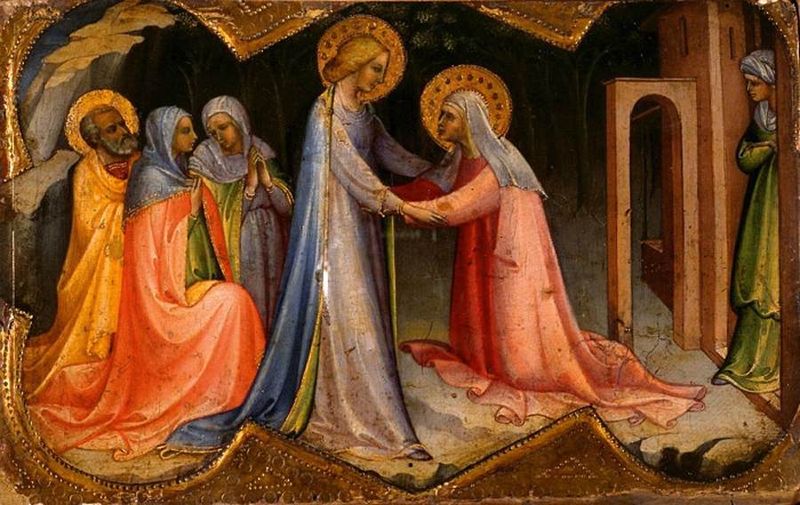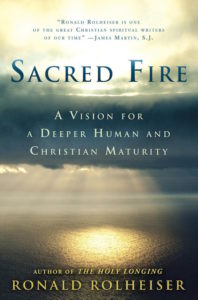Mature Faith and the Visitation – Homily for the Fourth Sunday of Advent

The Visitation by Lorenzo Monaco
I remember when Brenda was pregnant with each of our four kids,
how she would often talk with other women who were also pregnant.
There’s a bond that forms between mothers.
Only they understand what it’s like
to carry a living being within themselves.
Only they understand the cravings, the anxieties, the joys.
They learn from each other, commiserate with each other,
reassure each other.
And that bond doesn’t end after the babies are born.
It continues as the children get their first teeth, get out of diapers,
start school, make their first communion, go on their first date,
get their first job, get married, and have children of their own.
As we stand on the threshold of Christmas,
the Scriptures present us with a meeting between two expectant women.
Like all mothers, they share a common bond.
But they’re also connected in several unique ways.
One of these women is too old to be pregnant,
the other is too young.
Their sons will grow up at the same time,
they will speak God’s word,
and they will both be killed.
The younger woman, Mary, has traveled in haste,
eager to see her older relative Elizabeth.
What happens when they meet is an important example for all of us
in these last days of preparation before Christmas.
But before we get to that, it is important to understand who Elizabeth is.
She is a faithful Israelite, descended from Moses’ brother Aaron.
Her husband is Zechariah, a priest from the division of Abijah.
He and Elizabeth are both “advanced in years.”
And like other significant Israelite women of the past—
Sarah, Rebekah, Rachel, and Hannah—
Elizabeth is barren.
She hasn’t been able to have children.
But despite their age,
Elizabeth and Zechariah have continued to pray for a child,
until one day, when Zechariah is serving his turn as priest,
an angel of the Lord tells him that their prayers have been answered.
They’re going to have a son.
Elizabeth and Zechariah represent Israel’s faithfulness.
After years of not getting what they wanted, they still had hope.
Their struggles and difficulties have given them a mature faith.
It is not perfect faith—Zechariah at first doubted the angel’s message.
But it is a mature faith.
In his book Sacred Fire,
Fr. Ron Rolheiser describes the mark of a mature Christian.
 He says there are many signs of what it means to be a mature disciple,
He says there are many signs of what it means to be a mature disciple,
but in order to understand mature faith concretely,
he takes the image of blessing as the mark
of a deeply mature disciple of Jesus.
The mature Christian, he says, blesses others and blesses the world,
just as God does and Jesus did.
And now as we turn to the meeting between Elizabeth and Mary,
we can see the important example it is for all of us.
Because this is exactly what Elizabeth does when she meets Mary.
“Blessed are you,” she says, “and blessed is the fruit of your womb.”
“Blessed are you who believed
that what was spoken to you by the Lord would be fulfilled.”
Elizabeth blesses Mary.
But this incident is more than an older woman blessing a younger woman.
This is the Old Covenant blessing the New Covenant.
Elizabeth, Zechariah, and their son John the Baptist represent
the mature faith of Israel,
a faith that has been tested through the centuries.
The chosen people have undergone slavery in Egypt,
exile in Babylon, and occupation by Romans.
Their faith has not been perfect.
They have worshipped the golden calf,
complained to Moses in the desert,
and turned to foreign gods.
But through their struggles and failings,
their faith continued to deepen and mature.
And it is with this mature faith that Elizabeth meets Mary.
Imperfect faith meets perfect faith and blesses it.
Faith does not need to be perfect to bless.
In these last days before Christmas,
we can follow the example of Elizabeth and bless others.
Like the Israelites, our lives have been filled with struggles and failings.
We have been slaves of sin, have complained,
have worshipped false gods.
But this is how we grow, this is how our faith deepens.
This is how we become mature disciples.
It is a sign of our maturity when we bless others and bless the world.
The Catechism reminds us that
“Every baptized person is called to be a blessing and to bless.” CCC 1669
So how do we bless others?
As Fr. Rolheiser writes, there are three components to a blessing.
First, to bless someone means to see them.
It means recognizing they are there,
acknowledging their presence, and appreciating it.
This is especially important for adults to do,
or for those in positions of power.
It’s so easy to overlook the young or the powerless,
but they need our blessing most of all.
As Christmas approaches,
who is the least seen in our family, in our workplace, in our neighborhood?
We bless people first of all by seeing them.
Second, to bless someone means to speak well of them.
“We bless others when we take delight in them,
when we speak well of them,
when we feel their presence and energy as a gift rather than a threat.”
It means to tell them out loud,
“I’m so glad you’re here!”
“I’m proud of you.”
“Well done!”
“I love being around you!”
Blessings are best articulated in words,
but “there are ways beyond words to tell others
that we take delight in them,
just as there are many ways to communicate to others
that we find them a threat or irritation in our lives.
We bless more with our body language and our attitudes
than we do with our words.”
Many of us will be around family in the next few days.
What are the ways we can bless them by speaking well of them?
The final component of a blessing
is to give away some of our own life
so that others may have more life.
In other words, to bless someone fully is to die for them in some way.
“A blessing is not just an affirmation…To fully bless someone is to give up some life for that person, to die for him or her in some real way.”
This is what being a good parent is all about—
sacrificing our lives for our children,
to give away some of our own lives so that they can live.
As we approach Christmas, how can we give away some of our own life
for the sake of someone who needs life?
This is what it means to fully bless someone.
“To bless someone is to see and admire that person,
[to] speak well of him or her,
and [to] give away some of your life so that he or she might have more life.”
This is what Elizabeth does for Mary.
First, she sees Mary;
with the help of the Holy Spirit
she recognizes the life growing within her,
that Mary is “the mother of my Lord.”
Second, she speaks well of Mary,
telling her that she is blessed among women,
that she is blessed for believing in what the angel had spoken to her.
And finally, by her humility, Elizabeth gives away some of her life.
“How does this happen to me,
that the mother of my Lord should come to me?”
This is what it means to be a mature person of faith,
because this is what Christ came into the world to do.
It is Christ the Incarnation who sees each one of us.
It is Christ who speaks well of us, if only we would take the time to listen.
And it is Christ who gives up his life so that we may have eternal life.
In these last days before celebrating the Incarnation,
we have the chance to bless each other.
All of us here are like Mary, pregnant with Christ.
Christ lies within each of us waiting to be born.
That makes a bond between all of us.
We all know the struggles that come with being a Christian.
As we prepare for the birth of Christ in each of us at Christmas,
we can also follow the example of Elizabeth and bless those in our lives.
This week and always,
we ask God to give us strength and wisdom
so that we may see, really see, the people in our lives;
so that we may speak well of them;
and so that we may give our lives for them.
Podcast: Play in new window | Download
Subscribe: RSS































